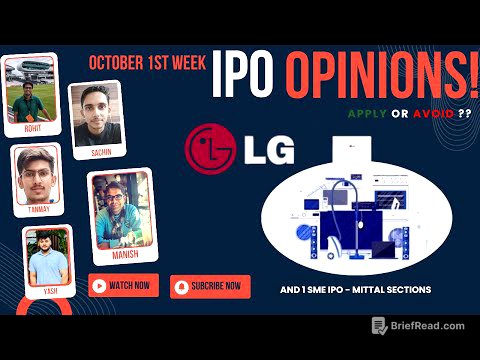TLDR;
This video explores emerging research in depression prevention and treatment, moving beyond traditional methods to address underlying causes like inflammation and nervous system dysregulation. It covers a range of interventions, including transcranial magnetic stimulation (TMS), anti-inflammatory approaches, gut microbiome healing, ketamine and esketamine, genomic sequencing, oxytocin, chiropractic manipulation, and vagus nerve stimulation, emphasizing holistic and individualized treatment approaches.
- Transcranial Magnetic Stimulation (TMS) is effective for treatment-resistant depression.
- Anti-inflammatory approaches, including diet and exercise, can reduce systemic inflammation and improve mood.
- Gut microbiome health is crucial for neurotransmitter production and overall well-being.
Introduction [0:08]
The presentation introduces emerging research in depression prevention and treatment, focusing on interventions beyond traditional methods. These include transcranial magnetic stimulation, anti-inflammatory approaches, gut microbiome healing, ketamine and esketamine, genomic sequencing, oxytocin, Chiropractic manipulation, and Vagas nerve stimulation. The aim is to review these new types of interventions designed to prevent or treat depression.
Transcranial Magnetic Stimulation (TMS) [0:36]
TMS is a non-invasive neuromodulation technique using magnetic fields to stimulate nerve cells in the brain, targeting areas involved in mood regulation. It involves placing an electromagnetic coil against the scalp, generating a magnetic field that penetrates the skull without discomfort or damage. TMS influences the left dorsal lateral prefrontal cortex, crucial for mood regulation, decision-making, and executive functioning. It also interacts with the subgenual anterior singulate cortex, associated with depression-related hyperactivity, the default mode network involved in rumination, and the salience and cognitive control networks, all critical for emotion regulation and cognitive processing.
Effectiveness and Neuroimaging Insights of TMS [4:01]
Accelerated TMS (aTMS) protocols show significant reductions in depression symptom severity, with patients reporting symptom improvement within days and no decline in cognitive functioning. Neuroimaging studies, such as functional MRI and PET scans, correlate brain changes with treatment response, indicating potential biomarkers for aTMS efficacy. TMS is effective for treatment-resistant depression and geriatric depression, with clinical response rates varying based on TMS protocols, patient characteristics, and dosing strategies. Older adults may require higher stimulation intensities due to age-related brain atrophy.
Emerging Trends and Recommendations for TMS [11:14]
Advances in neuroimaging and connectivity mapping can produce individualized TMS targeting, particularly helpful for those with a history of trauma or traumatic brain injury. Accelerated TMS protocols are gaining popularity due to their rapid effects and potential for reducing lengthy treatment schedules. Integrating TMS with other approaches may improve outcomes, especially in treatment-resistant populations. Larger, well-controlled trials are needed to standardize TMS protocols, optimize dosing, and identify predictors of treatment responses, especially in older adults.
Anti-Inflammatory Approaches [14:35]
Inflammation in the body correlates strongly with mood disorders, with brain inflammation playing a central role in the development of depression. Chronic psychological or physiological stress leads to HPA axis hyperactivity, increasing cortisol, which paradoxically may induce glucocorticoid resistance over time, promoting inflammation. Systemic infections can trigger peripheral immune responses that affect the brain via cyto kind signaling or by crossing a compromised blood-brain barrier. Trauma during critical developmental periods alters HPA axis regulation and immune function, increasing lifelong vulnerability to inflammation and depression.
Inflammation and its Impact on the Brain [20:58]
Pro-inflammatory cyto kindes interfere with serotonin, dopamine, and glutamate pathways, reducing neuroplasticity and altering mood regulation. Inflammation affects key brain areas involved in mood regulation, such as the prefrontal cortex, amydala, and hippocampus. Inflammatory cyto kindes reduce the level of brain-derived neutrophic factors, crucial for neuronal survival and plasticity. Chronic depression maintains HPA axis overactivation, leading to sustained cortisol secretion and immune system modulation, perpetuating inflammation.
Strategies to Reduce Inflammation [25:14]
Anti-inflammatory medications, while helpful for some, are not a long-term solution. Moderate aerobic exercise modulates cyto kind levels, increases anti-inflammatory markers, improves mood, and enhances neuroplasticity. Anti-inflammatory diets rich in omega-3 fatty acids, fruits, vegetables, and whole grains are linked to reduced depressive symptoms. Probiotics and gut microbiome repair may also help reduce systemic inflammation and improve depressive symptoms by modulating the gut-brain axis. Stress reduction in each piece of life is crucial, addressing physical, interpersonal, emotional, cognitive, and environmental stressors. Transcranial magnetic stimulation also reduces neuroinflammation by modulating brain excitability and altering cyto kind production.
Gut Microbiome and its Influence on Depression [34:12]
The gut microbiome consists of trillions of microorganisms that significantly influence digestion, immune modulation, and brain function. The vagus nerve acts as a communication highway between the gut and the brain, influencing immune responses, gut motility, and neurotransmitter production. Gut microbes modulate the production of neurotransmitters like serotonin, Gaba, and dopamine. Disbiosis, or an imbalanced microbiome, leads to leaky gut, disrupting neurotransmitter synthesis and contributing to depression.
Strategies for Gut Microbiome Repair [42:52]
Probiotics are beneficial bacteria that can improve mood, regulate the HPA axis, and reduce inflammation. Prebiotics are non-digestible fibers that promote beneficial bacteria growth, enhancing mental health. Diets rich in fiber from prebiotics, whole grains, polyphenols, and fermented foods support microbial diversity and reduce inflammation. Fecal microbiota transplantation can restore a healthy microbiome and improve mood disorders in extreme circumstances. Vagus nerve stimulation also supports gut health by promoting a balanced gut-brain axis.
Phytopharmacology and Other Treatments [46:27]
Phytopharmica theapy involves using Herbal Remedies and plant-derived compounds to manage depression by modulating neurotransmitter pathways, reducing oxidative stress and inflammation. Saffron, lemon balm, lavender, gingo baloba, and panex gensing are examples of herbs with antidepressant properties. Ketamine and esketamine produce rapid antidepressant effects, with esketamine approved for treatment-resistant depression, but careful regulation is needed to prevent dependence. Disruption of sleep and circadian rhythms can lead to desynchronization between the internal clock and the external environment, increasing vulnerability to chronic stress, inflammation, and depression.
Genomic Sequencing, Oxytocin, and Chiropractic Care [55:34]
Genomic sequencing identifies Gene variations that influence how well individuals produce, transport, or respond to mood-related chemicals, helping to find more effective anti-depressants. Oxytocin helps regulate emotions and stress hormone levels, strengthening the connection between the amydala and the prefrontal cortex, leading to better mood stability and less emotional reactivity. Chiropractic care may improve the function of the vagus nerve by improving spinal alignment, helping to trigger the relaxation response. Vagus nerve stimulation, done via an implanted device, increases activity in brain areas related to mood regulation, boosting neurotransmitter release and reducing inflammation.
Acupuncture and Oldies but Goodies [59:22]
Acupuncture stimulates nerves, muscles, and connective tissues, promoting natural healing processes, releasing endorphins, and reducing cortisol levels, increasing serotonin and dopamine. It can be as effective as some anti-depressants for mild to moderate depression, especially when combined with other treatments. "Oldies but goodies" include ruling out gatal hormone imbalances, thyroid hormone imbalances, nutrient deficiencies, irritable bowel syndrome, Crohn's disease, colitis, alcohol consumption, diabetes, chronic pain, hyper parathyroid, chronic fatigue syndrome, long c, and hearing loss.
Conclusion and Q&A [1:01:24]
Depression results when hormones and neurotransmitters get out of balance, often due to inflammation caused by stress. Typical pharmacotherapy does not address inflammation or sympathetic dominance, nor does it strengthen the vagus nerve. Treatment must be holistic and individualized to be effective. TMS can be used to treat alcohol-related brain changes. A protocol for working with clients receiving TMS involves identifying triggers for depression and making small changes in various areas of life. Exercise comes in many different forms, and finding something the individual is willing to do is key.









